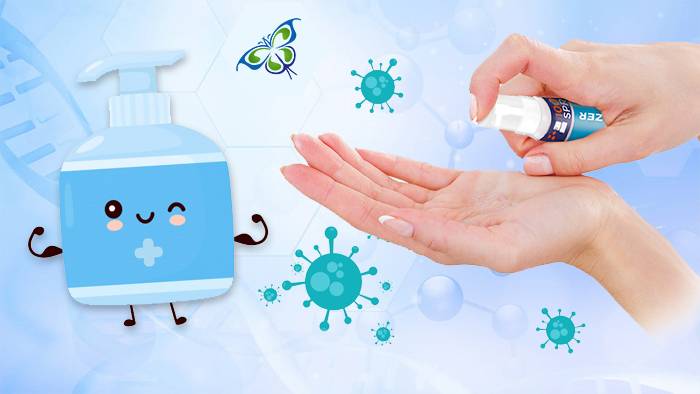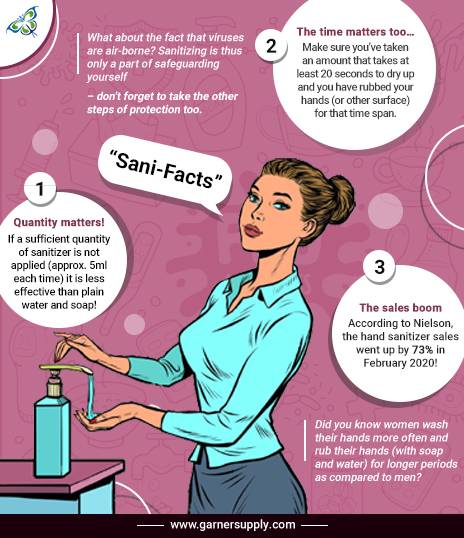7 Facts you didn’t know about Sanitizers | Article | Garner Supply

Hand Sanitizers are gel-like fluid with alcohol as the primary ingredient. It was first developed as an alternative to soap and water. However, treating sanitizers as an alternative to soap can be harmful in the present conditions. Sanitizers are extra protection after a soap wash. It kills invisible bacteria and viruses present in our skin and protects us from infections.
Sanitizers are of two kinds –
• Alcohol-based: contains 65-95% alcohol in the form of ethanol, isopropanol, or alike.
• Alcohol-free: are based on disinfectants like benzalkonium chloride or antimicrobial agents.

Before you buy a sanitizer today, keep these facts in consideration:
Fact #1: It is Effective if properly applied
How effective a sanitizer is, depends on a lot of factors including its application. Sanitizers are alcohol-based and have a low boiling point. Rubbing the hands against each other causes friction and generates heat. This evaporates the alcohol content along with the germs in it.
It is recommended to take a coin-sized amount and rub it against the palm until it's dry.
Fact #2: Dosage and Formulations matter
As mentioned earlier, sanitizers contain 65-95% alcohol, anything less will not be effective. On the contrary, the low alcohol content in a sanitizer encourages bacterial growth.
Dosage is important as well. If your sanitizer dries up within 5 seconds of applying, you are taking the wrong quantity. The sanitizer must cover the palms and the under-nails. It must be rubbed for 30 seconds and more.
Fact #3: Hand Sanitizers kill Flu-Virus and Transient Germs
Transient germs are disease-causing organisms that live on the layers of the skin. They get transmitted via touch or objects. Sanitizers help avoid transmission by killing germs. Though it cannot prevent the ailment but can control cross-contamination. Sanitizers have proven to kill viruses that cause influenza, H1N1, and more.
Note: Most viruses are air-borne and only opting for sanitizers is not the only protection. Protections for flu are multi-faceted and a sanitizer is one of them.
Fact#4: Sanitizers are NOT an alternative to soap and water
For long, this myth has been believed that using either a sanitizer or soap has similar effects. Studies show both have different actions on our skin. Soap and water clean visibly dirty hands and wash out ‘some’ germs down the drain. Sanitizers, on the other hand, kill the germs living on the skin and are invisible. According to WHO, hand sanitizers are quick in action and more effective against certain germs.
Fact #5: Hand Sanitizers are Safe for Kids
Kids have sensitive and delicate skin. However, that doesn’t make sanitizers harmful to them. The alcohol content in sanitizers is pretty high. This makes the kids exposed to alcohol content, but major effects are rare. Make sure your kid doesn’t overuse the product, then it’s good to go.
Fact#6: Sanitizers DO NOT Irritate the Skin
Hand sanitizers do not irritate the skin, which is very rare. Sanitizers include certain ingredients like emollients to keep the skin soothing and protected. Experts claim sanitizers have a gentler effect on skin than soap. They are milder to the skin and impart extra moisture. However, they aren’t a replacement for each other and are equivalently important.
Fact#7: Sanitizers CANNOT be formulated at home
Several people have this misconception, that sanitizers can be created with homely products. This is all wrong and a homemade blend cannot be counted as effective. Preparing a sanitizer with more than 65% of alcohol content is hard to achieve by non-professionals. For best results, avoid homemade products and purchase a good quality sanitizer.
Stay updated about health issues and protect yourself and your family from diseases. Wash your hands following guidelines to prevent unwanted germs.



Validate your login
Sign In
Create New Account